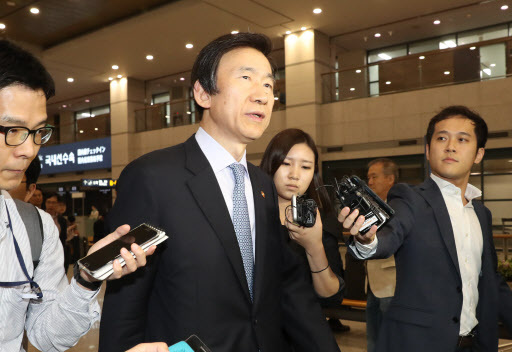Seoul and Washington on Thursday failed to reach a consensus over the permanent stationing of US strategic assets on the peninsula, amid skepticism due to US financial and operational constraints, saying further discussions are needed.
But after the annual Security Consultative Meeting with US Defense Secretary Ash Carter in Washington, South Korean Defense Minister Han Min-koo indicated the allies may take additional military steps other than the dispatch of a nuclear bomber and advanced warship here to better counter North Korea’s growing threats.
 |
Foreign Minister Yun Byung-se (Yonhap) |
“We will look into such measures going forward including the standing deployment of US strategic assets … to improve the implementation of the US’ extended deterrence,” Han said at a joint news conference.
The talks followed their joint meeting involving Foreign Minister Yun Byung-se and Secretary of State John Kerry, after which they unveiled plans to launch a vice-ministerial consultative body, titled the “Extended Deterrence Strategy and Consultation Group,” tasked with looking into ways to advance the execution of extended deterrence.
The idea of a lasting stay of US strategic assets was floated in the wake of North Korea’s fourth and fifth atomic experiments this year as many lawmakers and experts here call for measures beyond a one-off dispatch of warplanes and other weapons upon major provocations from across the border.
Ahead of the SCM, the two countries’ defense agencies had reportedly been looking into whether the B-1B nuclear bomber and Aegis-equipped destroyer could be sent.
But skepticism persists given the potential impact on their operational plans and the costly maintenance prices at a time when the US grapples with budget constraints.
The issue will continue to be dealt with through the newly created body and other channels, Yun said.
“There will be discussions over how to operate the group in detail, which I think would accelerate given the grave situation on the peninsula,” the minister told reporters upon his return from Washington.
“We will explore various measures to advance the enforcement of the extended deterrence including the constant circulative stationing of US strategic assets.”
In a joint communique, Washington reaffirmed its commitment to defend its key Asian ally. Carter pledged to reinforce its extended deterrence including the nuclear umbrella, conventional strike capabilities and missile defense, saying the country is ready to respond to “any threat with the full spectrum of American military might.”
The two defense chiefs warned Pyongyang against additional provocations, condemning Thursday’s failed attempt to test fire an intermediate-range ballistic missile.
“As with previous tests, we strongly condemn last night’s attempt, which even in failing violated several UN Security Council resolutions,” Carter said.
“Make no mistake, any attack on America or our allies will not only be defeated, but any use of nuclear weapons will be met with an overwhelming and effective response.”
By Shin Hyon-hee / (
heeshin@heraldcorp.com)





![[Exclusive] Hyundai Mobis eyes closer ties with BYD](http://res.heraldm.com/phpwas/restmb_idxmake.php?idx=644&simg=/content/image/2024/11/25/20241125050044_0.jpg)
![[Herald Review] 'Gangnam B-Side' combines social realism with masterful suspense, performance](http://res.heraldm.com/phpwas/restmb_idxmake.php?idx=644&simg=/content/image/2024/11/25/20241125050072_0.jpg)

